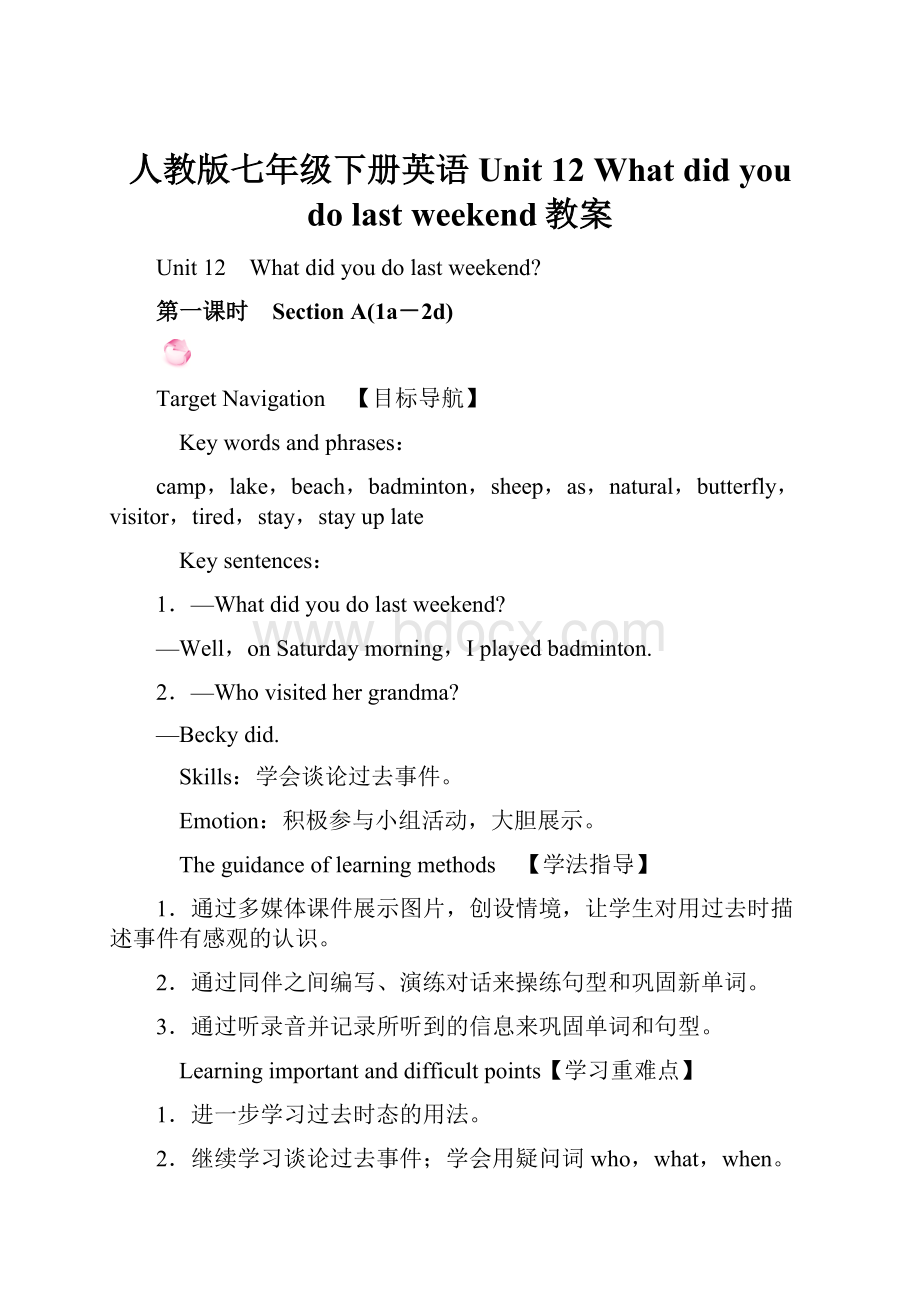人教版七年级下册英语Unit 12 What did you do last weekend教案.docx
《人教版七年级下册英语Unit 12 What did you do last weekend教案.docx》由会员分享,可在线阅读,更多相关《人教版七年级下册英语Unit 12 What did you do last weekend教案.docx(16页珍藏版)》请在冰豆网上搜索。

人教版七年级下册英语Unit12Whatdidyoudolastweekend教案
Unit12 Whatdidyoudolastweekend?
第一课时 SectionA(1a-2d)
TargetNavigation 【目标导航】
Keywordsandphrases:
camp,lake,beach,badminton,sheep,as,natural,butterfly,visitor,tired,stay,stayuplate
Keysentences:
1.—Whatdidyoudolastweekend?
—Well,onSaturdaymorning,Iplayedbadminton.
2.—Whovisitedhergrandma?
—Beckydid.
Skills:
学会谈论过去事件。
Emotion:
积极参与小组活动,大胆展示。
Theguidanceoflearningmethods 【学法指导】
1.通过多媒体课件展示图片,创设情境,让学生对用过去时描述事件有感观的认识。
2.通过同伴之间编写、演练对话来操练句型和巩固新单词。
3.通过听录音并记录所听到的信息来巩固单词和句型。
Learningimportantanddifficultpoints【学习重难点】
1.进一步学习过去时态的用法。
2.继续学习谈论过去事件;学会用疑问词who,what,when。
TeachingSteps 【教学过程】
AutonomousLearningScheme 【自主学习方案】
预习指导与检测
(一)预习指导
1.根据单元标题和图片等,预测新课内容。
2.根据音标拼读新单词并牢记。
3.勾画出重点和疑难点。
(二)预习检测
英汉互译
1.做作业________ 2.去海滩________
3.goboating________4.打羽毛球________
5.去电影院________6.campbythelake________
7.visitmygrandma____________
8.备考____________
9.workasaguide____________
10.over____________
11.Howinteresting!
____________
12.livinghabits____________
13.kindof________14.熬夜________
(Keys:
1.dohomework,2.gotothebeach,3.去划船,4.playbadminton,5.gotothecinema,6.在湖边野营,7.看望我的奶奶,8.studyforthetest,9.当导游,10.超过,11.多有趣啊!
12.生活习惯,13.有点,14.stayuplate)
ClassroomLearningGuidanceScheme【课堂导学案】
【探究一】
1.Learnthephrasesin1a.
2.Finish1a,thenchecktheanswers.
3.Lookattheconversation,andlearnthedrills:
—Whatdidyoudolastweekend?
—Well,onSaturdaymorning,Iplayedbadminton.
【探究二】Listenandfinish1b.Checktheanswers.
【探究三】Pairwork
Practicetheconversationin1c.Thenmakeyourownconversations.
【探究四】Listening
1.Gothroughthesentencesin2a.
2.Listento2aandunderlinethewordsyouhear.
3.Listenagain.WriteCforCarol,JforJackorBforBeckynexttothestatementsin2a.Thenchecktheanswers.
【探究五】Pairwork
1.StudentAasksquestionswithwho,whatorwhereandStudentBanswers.Finish2c.
2.Role-playtheconversationin2d.
【知识点拨】
1.介词by的用法:
(1)表示移动方向,意为“经过”。
如:
Mymothergoesbythebuildingeveryday.我妈妈每天从这栋楼旁经过。
(2)表示方式及手段,意为“用,靠,通过”。
如:
Ilearnitbyheart.我把它记在心头。
他以教书为生。
He________aliving________teaching.
(3)与交通工具名词连用时,名词前不用冠词,意为“乘,坐,用”。
如:
那人是坐公共汽车来的。
Themancame________________.
(4)相当于beside,意为“靠近,在……旁边”。
如:
她站在窗边。
Shestood________thewindow.
2.sheep为可数名词,意为“羊,绵羊”,其复数形式与单数形式同形。
如:
树底下有一只羊。
There________________________underthetree.
树底下有3只羊。
There________________________underthetree.
【拓展】
单复数同形的名词还有:
deer(鹿),fish(鱼),Chinese(中国人),Japanese(日本人)。
ClassroomEvaluationScheme 【课堂评价案】
详见当堂训练部分(即学生用书同步练习题)。
TeachingReflection 【教学反思】
本单元继续学习谈论过去的事件,所以本节课通过多媒体课件展示图片,创设情境,让学生对各种周末活动有感观的认识;通过同伴之间编写、演练对话来操练句型和巩固新单词;通过听录音并记录所听到的信息来巩固单词和句型,通过小组活动,让学生大胆展示,学习掌握新单词和句型:
camp,lake,beach,badminton,sheep,as,natural,butterfly,visitor,tired,stay,stayuplate;
—Whatdidyoudolastweekend?
—Well,onSaturdaymorning,Iplayedbadminton.
—Whovisitedhergrandma?
—Beckydid.
第二课时 SectionA(GrammarFocus-3c)
TargetNavigation 【目标导航】
Keywordsandphrases:
away,mouse,baby,shout,language,runaway,shoutat…
Keysentences:
(1)—Whatdidyoudolastweekend?
—Ididmyhomework./Wewentboating.
(2)—Whovisitedhergrandma?
—Beckydid.
(3)—Wheredidshegolastweekend?
—Shewenttoafarm.
(4)—Whodidshegowith?
—Shewentwithherclassmates.
Skills:
对过去的事情进行询问。
Emotion:
通过询问同学间过去所做的事情,增进同学间的感情。
Theguidanceoflearningmethods 【学法指导】
Groupwork,pairwork
Learningimportantanddifficultpoints【学习重难点】
1.总结归纳SectionA部分语法重点。
2.将所学知识学以致用。
TeachingSteps 【教学过程】
AutonomousLearningScheme 【自主学习方案】
预习指导与检测
(一)预习指导
1.根据GrammarFocus,归纳SectionA部分语法重点。
2.勾画出重点和疑难点。
(二)预习检测
英汉互译
1.熬夜________ 2.冲……大声叫嚷________
3.跑开________4.mouse(复数)________
5.livinghabits________6.language________
7.他和谁一起去的?
________________hego________?
(Keys:
1.stayuplate,2.shoutat,3.runaway,
4.mice,5.生活习惯,6.语言,7.Whodid,with)
ClassroomLearningGuidanceScheme【课堂导学案】
【探究一】GrammarFocus
1.Giveasummaryaboutit.
2.Trytoreciteit.
【探究二】
1.Gothrough3a&3bquickly.
2.Finish3a.Fillintheblankswithwho,what,when,whereorhow.
3.Completetheblanksin3bwiththecorrectformsofthewordsinthebox.
4.Checktheanswersandthenreadtogether.
【探究三】Groupwork
Thinkoftwothingsyoudidlastweekend.Drawpicturesofthem.Yourclassmatesguesswhatyoudid.
【探究四】Groupwork:
归纳疑问词who,what,when,where,how的区别,并造句。
Who________________________________________________________________________
What________________________________________________________________________
When________________________________________________________________________
Where________________________________________________________________________
How________________________________________________________________________
【知识点拨】
1.shout的用法:
shout动词,意为“呼叫,喊叫”,常用词组shoutatsb./tosb.冲某人呼叫、喊叫,前者多指因为生气而非善意地对某人吼叫,后者多指因为距离远而不得不大声喊叫。
如:
Hewassoangrythatheshoutedateveryonepresent.
2.away的用法:
away作副词,意为“远离、离开、消失”。
常用短语有faraway(远离),goaway(走开),runaway(跑开),rightaway(立刻、马上),awayfrom(距……多远)。
根据汉语提示填空。
(1)Tom,stay________(远离)fromhere,please.
(2)It'sonlythreekilometers________(距……远)here.
(3)Thegiraffe________(跑开)atoncewhenhesawthetiger.
(4)Hephonedhismother________(马上).
ClassroomEvaluationScheme 【课堂评价案】
详见当堂训练部分(即学生用书同步练习题)。
TeachingReflection 【教学反思】
本节课是SectionA的一个小结课,为了使课堂教学更吸引学生,课前需要精心准备,制作多媒体课件,将要复习的内容用课件展示,同时通过小组合作竞赛来激活课堂,将课堂内容设计成一个个任务,让学生通过完成任务得到奖励来获得学习的快乐。
第三课时 SectionB(1a-1e)
TargetNavigation 【目标导航】
Keywordsandphrases:
fly,kite,flyakite
Keysentences:
—Didyoudoanythinginterestinglastweekend?
—Notreally,butIvisitedmysister.
Skills:
进一步学习和谈论过去事件。
Emotion:
交流回忆以前做过的事情,增进同学间的相互了解。
Theguidanceoflearningmethods 【学法指导】
采用自主学习的方式,能根据需要进行有目的的预习。
Learningimportantanddifficultpoints【学习重难点】
1.继续学习一般过去时态。
2.区分有趣和无趣的活动;对事件进行评价。
TeachingSteps 【教学过程】
AutonomousLearningScheme 【自主学习方案】
预习指导与检测
(一)预习指导
1.根据图片和对话等,预测新课内容。
2.根据音标拼读单词并牢记。
3.勾画出重点和疑难点。
(二)预习检测
英汉互译
1.弹吉他____________
2.去图书馆____________
3.放风筝____________
4.和朋友共进晚餐____________
5.swimmingpool____________
6.Notreally.____________
(Keys:
1.playtheguitar,2.gotothelibrary,3.flyakite,4.havedinnerwithfriends,5.游泳池,6.不完全是;不见得。
)
ClassroomLearningGuidanceScheme【课堂导学案】
【探究一】
1.Learnandfinish1a.Thentrytorememberthephrases.
2.Game:
Quickactionaboutthephrases.
A:
flewakite B:
放风筝
3.Doyouthinktheactivitiesin1aarefun?
Drawahappyfaceoranunhappyfaceundereachline.
【探究二】Listening
1.Listen.WhatdidSallyandJimdolastweekend?
Completethechartin1c.
2.Listenagainandchecktheanswers.
【探究三】Pairwork
Makeaconversationwithapartner.TalkaboutwhatSallyandJimdidlastweekend.Thenaskwhatyourpartnerdidlastweekend.
如:
—Whowenttothelibrary?
—Sallydid.
—Didyoudoanythinginterestinglastweekend?
—Notreally,butI…
【知识点拨】
anythinginteresting意为“有趣的事”,形容词interesting修饰不定代词anything应后置,在句中做后置定语。
如:
1.他告诉我们一些有趣的事。
Hetoldus________________.
2.这并不是什么重要的东西。
Thisisn't________________.
注意:
不定代词something一般用于肯定句;anything一般用于否定句、疑问句和条件状语从句。
如:
1.你想要一些吃的东西吗?
Wouldyoulike________________________?
2.你如果想要吃任何东西,可以给我打电话。
Ifyouwant________________________,callme.
ClassroomEvaluationScheme 【课堂评价案】
详见当堂训练部分(即学生用书同步练习题)。
TeachingReflection 【教学反思】
本节课通过一系列的听说活动,让学生学习掌握重点单词“fly,kite,flyakite”和重点句子“Didyoudoanythinginterestinglastweekend?
Notreally,butIvisitedmysister.”。
新课标要求词不离句,所以在处理1a的拓展词汇教学中,要根据学生真实的周末活动,创设真实的情境,结合本单元所学功能句对新单词进行学习;在1a-1c的听力训练中,要引导学生听前浏览所给词汇,听中学会捕捉关键词;听前浏览对话,预测未知信息,听中速记关键词,听后复核的学习策略;通过阅读表格,找出需补全的文字信息,确定考查点,增强听音的目的性。
第四课时 SectionB(2a-2c)
TargetNavigation 【目标导航】
Keywordsandphrases:
high,ago,India,tent,moon,surprise,snake,scared,move,start,jump,wake,into,forest,ear,highschool,putup,eachother,getasurprise,shoutto,upanddown,wake…up
Keysentences:
(1)Lastweekendwasinterestingbutscary.
(2)IwassoscaredthatIcouldn'tmove.
Skills:
学会对自己的旅行进行描述。
Emotion:
交流旅行见闻,增加阅历。
Theguidanceoflearningmethods 【学法指导】
让学生围绕着课堂任务在小组中分工合作,在活动中相互探讨、相互交流、相互合作。
Learningimportantanddifficultpoints【学习重难点】
1.根据文章找寻关键信息,提高阅读能力。
2.能用所学知识介绍自己丰富多彩的上周末生活。
3.理解较长文章,用所学知识写出完整的文章。
TeachingSteps 【教学过程】
AutonomousLearningScheme 【自主学习方案】
预习指导与检测
(一)预习指导
1.根据图片和文章标题等,预测新课内容。
2.根据音标拼读单词并牢记。
3.自学短文,勾画出重点和疑难点。
(二)预习检测
英汉互译。
1.高中________ 2.搭帐篷________
3.生火________4.eachother________
5.so…that…________6.lookoutof________
7.上上下下________8.把……弄醒________
9.对……喊________10.learnfrom________
11.大吃一惊________12.usefullesson________
(Keys:
1.highschool;2.putupone'stent;3.makeafire;4.相互;5.如此……以至于……;6.往……外面望;7.upanddown;8.wake…up;9.shoutto;10.向……学习;11.getaterriblesurprise;12.有用的教训)
ClassroomLearningGuidanceScheme【课堂导学案】
【探究一】Whatkindsofanimalsarepeoplesometimesafraidof?
Why?
Makealist.
【探究二】
1.ReadaboutLisa'sweekendandanswerthequestionsin2b.
2.Groupwork:
readthearticleagain,trytofindthekeypoints.
Thensaythemoutonebyone.
如:
(1)middleschool/highschool/…
(2)ago…
(3)…
【探究三】Consolidation
1.Readthekeypointsandthearticletogether.
2.Readagainandcomplete2c.Putthephrasesinorder.
3.Groupwork:
Retellthestoryaccordingto2c.
【探究四】Groupwork:
回顾阅读考试题型,总结归纳提高阅读的方法。
Notes:
________________________________________________________________________
________________________________________________________________________
【知识点拨】
1.so…that…“如此……以至于……”句型中的so是副词,常常用来修饰形容词或副词,引导结果状语从句。
如:
他是如此年幼,以至于他不能照顾自己。
Heis________________________hecan't________________himself.
2.surprise
(1)n.惊奇,惊讶。
如:
Billlookedathiminsurprise.比尔惊讶地看着他。
(2)v.使……感到吃惊。
如:
Thenewssurprisedus.这条消息使我们吃惊。
surprisedadj.感到惊讶的。
surprisingadj.令人惊讶的。
如:
我们对这则惊人的消息感到惊讶。
We